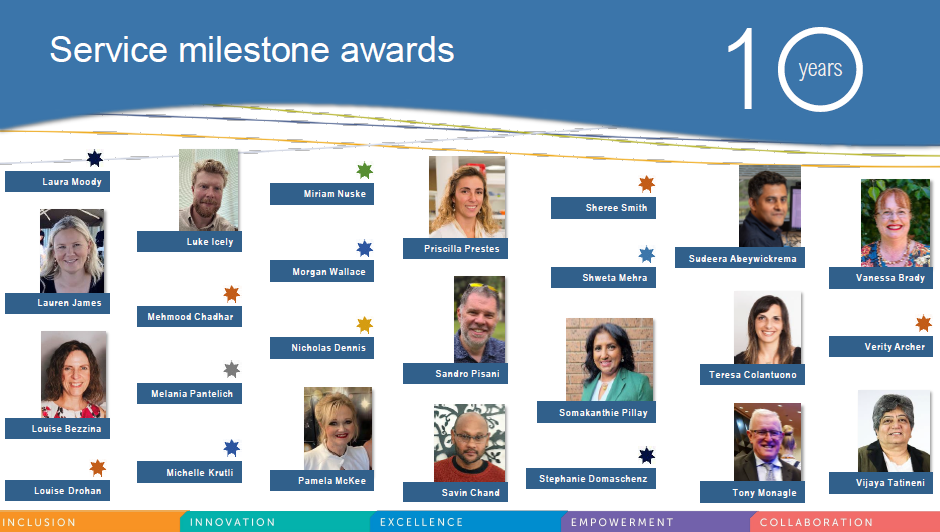
CeRDI Newsletter Summer 2024
In this issue:
- Message from the Director
- CeRDI receives Vice Chancellor’s Award
- CeRDI 25: Another Five of our Best Projects
- GRDC Data Partnership Initiative
- Australian National Soil Information System
- Enabling Soil Data: Research and Resource
- My Farm Dashboard
- Managing and Sharing Research Data – Researchers’ Points of View
- Online Farm Trials Update
- CeRDI Staff Celebrate Service Milestones
- News Snippets
- Staff Profile: Dr Alicia Reynolds, Research Associate, CeRDI
- HDR News
- About CeRDI
- Contact CeRDI
Message from the Director
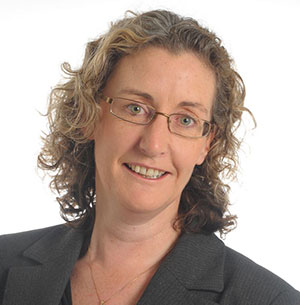 |
|
|
Professor |
|
As we settle into 2024, we take the opportunity to reflect on our past successes and recent achievements, many of which are showcased in this issue of the newsletter.
One of the highest accolades bestowed on CeRDI late last year was the Vice Chancellor’s Award for Excellence in Research Partnerships and Impact. The award capped off a significant year for CeRDI, in which we celebrated our 25-year anniversary.
The research activities presented in this newsletter exemplify the important research partnerships we foster. Each project highlights the breadth of our research engagement and activities, as well as the valuable outputs and learnings generated from the research.
In the coming weeks, the University will receive the results from the 2019-2023 External Research Review and consider recommendations linked to research priorities and future directions. CeRDI will look to play a key role in the next steps for research at Federation with much to share - and contribute - as the University commences this next chapter of research.
We take the opportunity to thank Professor Chris Hutchinson for the support he’s provided during his time as Deputy Vice Chancellor (Research and Innovation) and look forward to the new international partnerships and collaboration opportunities that will result from the creation and management of partnerships for Federation through his new role as the Vice-Chancellor’s Ambassador for International Partnerships based in the United Kingdom.
CeRDI receives Vice Chancellor’s Award
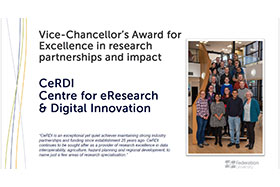 |
|
CeRDI recently received the Vice Chancellor’s Award for Excellence in Research Partnerships and Impact. These annual awards recognise exceptional performance by an individual or team that contributes to and supports Federation University’s Strategic Plan.
This award recognises CeRDI’s research achievements as the longest running and most successful research centre at Federation University. CeRDI’s research successes are founded in the long-term partnerships with local, state, national and international organisations, and collaborators. Exemplifying this is the established and ongoing success of our linkage with the Cooperative Research Centres (Food Agility; High Performance Soils) through which strong connections have been forged between industry, government, and other universities.
Collectively, these partnerships have led to university-wide benefits that contribute to institution-wide research income and growth, enhanced reputation and expertise as a leader in research data management and technologies, and HDR candidates and PhD completions with scholarships and top up scholarships, enabled by through CeRDI’s strong industry partnerships.
CeRDI 25: Another Five of our Best Projects
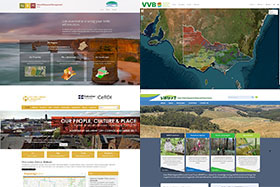 |
|
In our December 2023 newsletter we commenced a series of stories showcasing projects that have marked CeRDI’s successful 25-year anniversary - Visualising Victoria’s Groundwater, Soil Health Knowledge Base, Agricultural Research Federation, Online Farm Trials, Waterwatch and EstuaryWatch.
In this issue, we’re continuing the series, focusing on CeRDI-led research that further demonstrates the unique and important research and technology achievements that characterise CeRDI’s 25-year journey.
GRDC Data Partnership Initiative
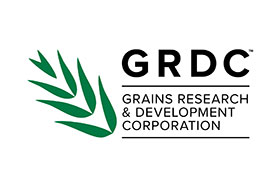 |
|
The Grains Research and Development Corporation (GRDC) Data Partnership Initiative is a $2.8 million investment over 18 months bringing together 12 of GRDC’s partner organisations and aims to develop their capacity to manage research data assets in such a way that they can be accessed and reused for further research. This project aligns with the FAIR Data Principles that research data should be findable, accessible, interoperable and reusable. To address the ‘findable’ component, the GRDC developed a Data Catalogue which would contain metadata records for GRDC co-owned data assets to enable data discovery.
As a foundation partner on the project, Federation University instigated a Community of Practice, building a collaboration between project partners. Through this role, CeRDI supported GRDC and its major research partners to populate the Data Catalogue with a rich set of metadata records relating to valuable data assets that had been generated over the previous 10 years of GRDC investment. Prof Helen Thompson, Jennifer Corbett, Peggy Hsu, Richard Archer and Dr Carolyn Staines led Federation’s engagement on the Initiative.
Australian National Soil Information System
 |
|
The Australian National Soil Information System (ANSIS) ![]() provides access to nationally consistent soil data and information to support the sustainable management of soils. ANSIS Phase 1 was developed through a two year project (2022-2024) undertaken by CSIRO for the Australian Government Department of Agriculture, Forestry and Fisheries (DAFF).
provides access to nationally consistent soil data and information to support the sustainable management of soils. ANSIS Phase 1 was developed through a two year project (2022-2024) undertaken by CSIRO for the Australian Government Department of Agriculture, Forestry and Fisheries (DAFF).
The description, transfer, and harmonisation of nationally consistent data through ANSIS required information exchange standards. Recognising this, the standards project was delivered under ANSIS. Federation University (lead Dr Megan Wong, CeRDI) and experts from CSIRO Environmental Informatics and Manaaki Whenua were engaged on the project.
Enabling Soil Data: Research and Resource
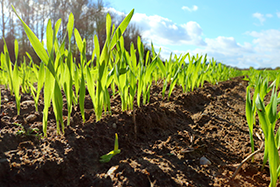 |
|
The Managing and Enabling Soil Data (ESD) project, an initiative between CeRDI and the Cooperative Research Centre for High Performance Soils (Soil CRC), aims to develop a fit-for-purpose approach to better manage data for future Soil CRC projects.
This two-year project was designed to respond to the rapid advances in technology that are leading to exponential growth in available soils data. Documenting soil data is essential for improved soil security, yet there are challenges associated with soil data management. These include difficulties and costs associated with managing this data as an enduring asset. Ensuring the interoperability and availability of soil data is essential as new technologies are being used.
My Farm Dashboard
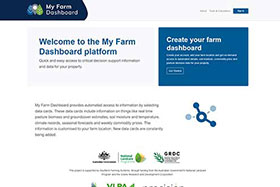 |
|
A new partnership is being developed with the New South Wales Department of Primary Industries (NSW DPI) to further extend the climatic data in the My Farm Dashboard. NSW DPI have developed a range of seasonal summaries and drought indicators to provide the agricultural sector with important decision support information. The NSW DPI Seasonal Conditions Team use the DPI Enhanced Drought Information System II (EDIS II) ![]() to generate drought information and indicator products down to a one kilometre grid resolution.
to generate drought information and indicator products down to a one kilometre grid resolution.
The DPI Combined Drought Indicator (CDI) provides a snapshot of current seasonal conditions for NSW based on rainfall, soil moisture and modelled pasture and crop growth indices. The CDI defines an area of NSW to be in a drought category if any of the indices fall below 30% when compared to historical records.
Managing and Sharing Research Data – Researchers’ Points of View
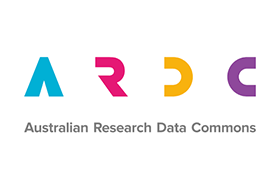 |
|
The Australian Research Data Commons (ARDC) has been conducting a program, Institutional Underpinnings, which aims to coordinate research data management across Australian universities. Federation University has been a partner in this program and, as part of this, a survey of Federation University researchers to determine their understanding of research data management and data sharing. CeRDI researchers were subsequently engaged in the analysis and interpretation of the survey results.
The move to make research data openly available and accessible to other researchers is a relatively recent approach, and this was reflected in the survey findings. While some were aware of the notion of “open” data and the data management processes required to achieve this, others were unfamiliar with it or considered it undesirable. The results of the survey suggested there were a number of knowledge gaps that needed to be addressed through skills development and procedural changes.
Online Farm Trials Update
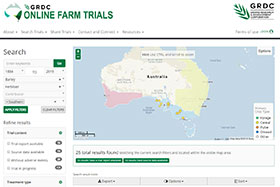 |
|
Online Farm Trials (OFT) ![]() provides access to data collected from on-farm and field-based cropping research trials. The portal is a collaboration between CeRDI and the Grains Research and Development Corporation (GRDC).
provides access to data collected from on-farm and field-based cropping research trials. The portal is a collaboration between CeRDI and the Grains Research and Development Corporation (GRDC).
In the period to June 2026, there are a range of exiting new developments planned for OFT with CeRDI to continue to provide research input and industry support aligned to the portal’s expansion. Key team members include Dr Nathan Robinson, Dr Aakansha Chadha and Dr Alison Ollerenshaw.
CeRDI Staff Celebrate Service Milestones
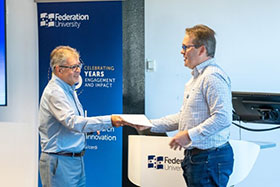 |
|
|
Paul Feely receives his 20-year service |
|
In late 2023, the University celebrated Service Milestones for 80 staff who have shown their ongoing dedication to the University, TAFE and predecessor institutions. Among the recipients were members of the CeRDI technical team. Paul Feely, Senior Systems Analyst programmer, celebrated his 20-year service milestone, which was acknowledge by Prof Chris Hutchison, during the CeRDI 25-year anniversary celebrations. Web developer and programmer Sudeera Abeywickrema, was also acknowledged for his service to the University, receiving a 10-year milestone award.
The milestone award recipients from the University are available at: 2023 University Milestone Awards ![]()
News Snippets:
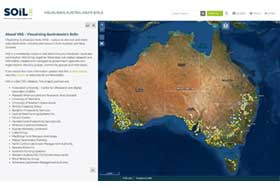 |
|
Soil CRC funding applications: CeRDI recently submitted funding applications to the Soil Cooperative Research Centre for High Performance Soils (Soil CRC). The applications involved extending research for two current projects, Visualising Australasia’s Soils ![]() and Soil Indicators. If successful, funding will extend the research and associated activities for these projects over the coming years.
and Soil Indicators. If successful, funding will extend the research and associated activities for these projects over the coming years.
Did you know? You can access CeRDI annual reports from our website. Recent updates allow PDF access to our report from 2014 onwards. The reports are a valuable record of CeRDI’s progress and research activities, documenting a small part of the Centre’s 25-year history. https://www.cerdi.edu.au/AnnualReports
Staff Profile: Dr Alicia Reynolds, Research Associate, CeRDI
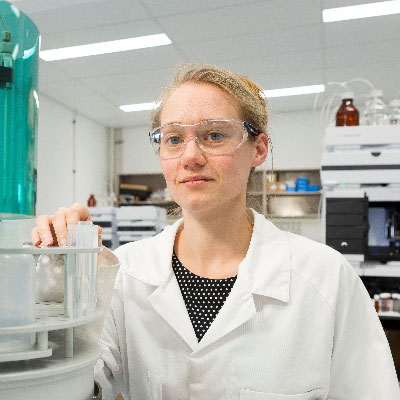 |
|
|
Dr Alicia Reynolds |
|
Alicia Reynolds brings a wide range of analytical chemistry experience to the CeRDI team. Alicia developed GC-MS/MS methods during her honours year and continued working for consulting and research organisations as an analytical chemist until 2010. She then completed a PhD with CSIRO in degradation of amine absorbents during pilot scale post-combustion capture (PCC) of CO2 from coal fired power stations. Recent industry-led research projects include responsible uses of Victorian brown coal (e.g., humic acid-based soil amendments, hydrogen and other materials), compost processing and contaminants management, and fish farm waste derived soil amendment development. Alicia's core interests include statistical methods for reducing large datasets to useful information, advanced analytical chemistry, and using research methods to solve real-world problems. In her role at CeRDI, Alicia is contributing to data analysis and associated processes on various projects, including Visualising Australasia’s Soils. Alicia is also affiliated with the Future Regions Research Centre, Carbon Technology Research Group.
https://www.cerdi.edu.au/cb_pages/alicia_reynolds.php
HDR news:
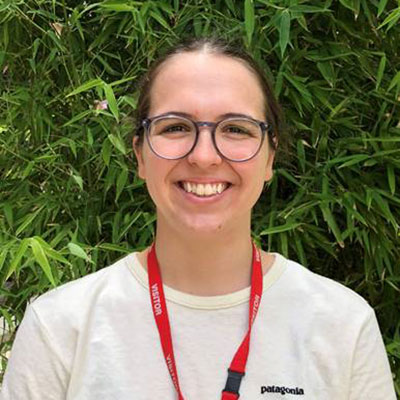 |
|
|
HDR candidate: Hannah Faraone |
|
New CeRDI HDR candidates:
Hannah Faraone recently commenced her PhD studies with CeRDI. Hannah is researching the impact of macrolitter on birdlife in the Port Phillip Region and Greater Melbourne. Hannah’s supervisors include Dr. Birgita Hansen (principal), and associate supervisors Dr. Nick Schultz (Federation University) and Dr. Jackie Myers (RMIT), with industry supervisor Kimberley MacDonald (DEECA). https://www.cerdi.edu.au/HDRStudents#HannahFaraone
Rida Mazhar also recently commenced her PhD studies with CeRDI. The topic of Rida's PhD is: Maximising data integration and interoperability for better regional outcomes. Supervisors: Helen Thompson (principal), and associate supervisor Shoaib Riaz. https://www.cerdi.edu.au/HDRStudents#RidaMazhar
PhD Completion: Congratulations to Dr Basharat Ali who received news of the successful completion of a Doctor of Philosophy. Basharat is an alumni of CeRDI. His PhD research “Investigating the roles of data, digital agriculture and resilience in agricultural performance”. Supervisors: Assoc Prof Peter Dahlhaus, Prof Helen Thompson, and Dr Nathan Robinson. Further information about Basharat’s PhD is available on the CeRDI website: https://www.cerdi.edu.au/cb_pages/precision_conservation_agricultural_practices.php
About CeRDI
The Centre for eResearch and Digital Innovation (CeRDI) is a research centre at Federation University Australia focused on:
- the application of information and communications technology (ICT) and the development of innovative, world class knowledge management systems;
- significantly advancing the digital literacy and knowledge management capabilities of partner organisations;
- fostering partnerships for the development and implementation of eResearch with industry, government and academia; and
- measuring the impact of eResearch and digital innovation through longitudinal research.
Contact CeRDI
For further details about CeRDI’s diverse portfolio of research please visit our website: www.cerdi.edu.au, or contact Director, Associate Professor Helen Thompson: h.thompson@federation.edu.au
Mailing Address
Centre for eResearch and Digital Innovation
Federation University Australia
PO Box 691
Ballarat Vic 3353
Office Location
Suite 15, Greenhill Enterprise Centre
Ballarat Technology Park
University Drive
Mount Helen Vic 3350
Phone: +61 3 5327 9314
Email: support@cerdi.edu.au
Subscribe to the CeRDI Newsletter Mailing List
I would like to subscribe to the CeRDI Newsletter Mailing List to receive notifications of future CeRDI Newsletters.
If you have any feedback, please email newsletter@cerdi.edu.au

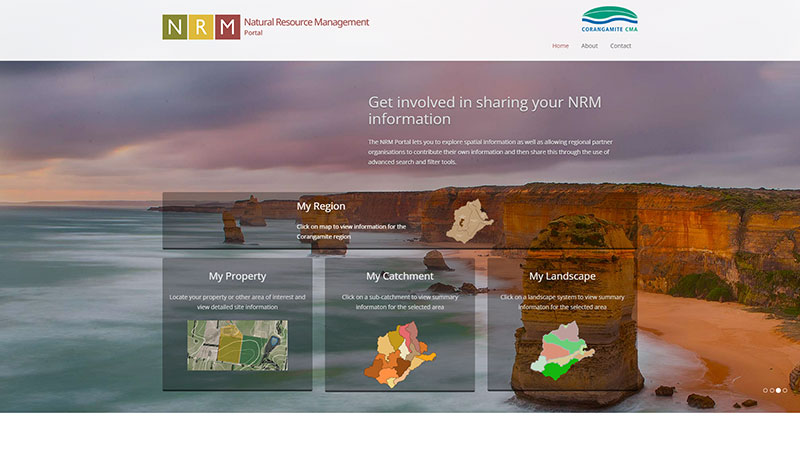
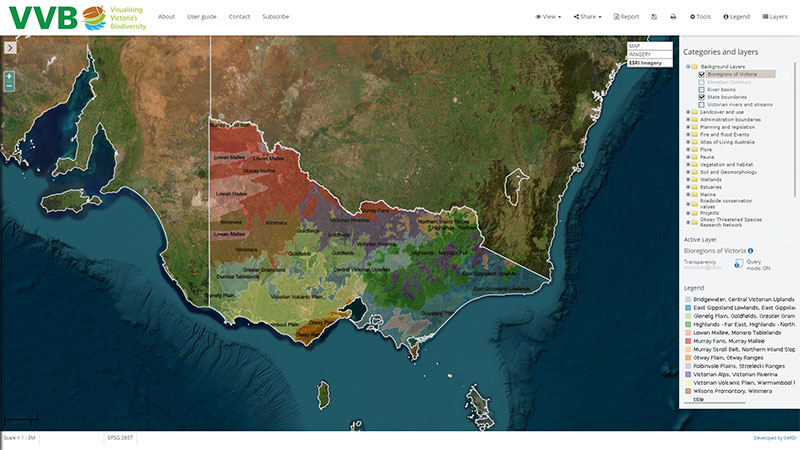
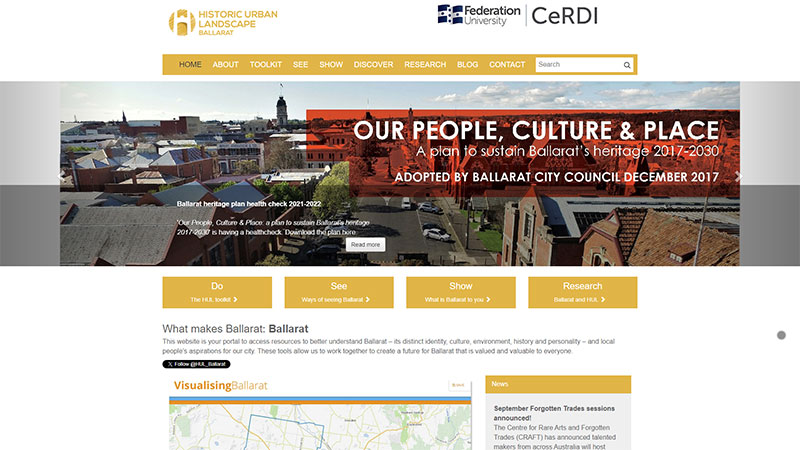
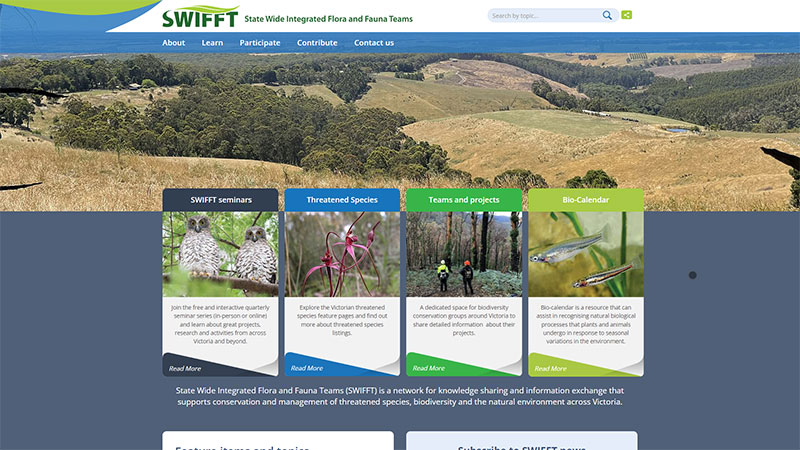

.png)
